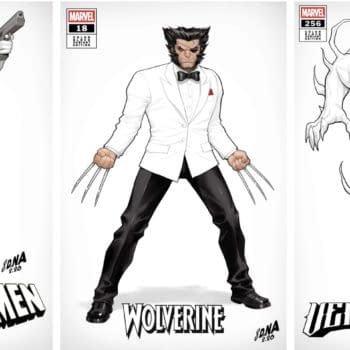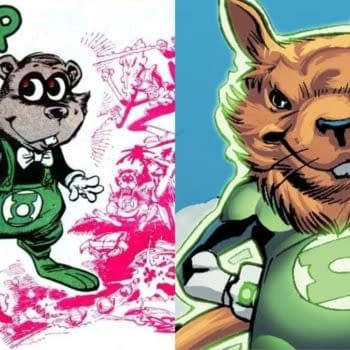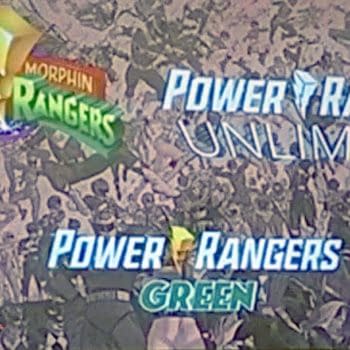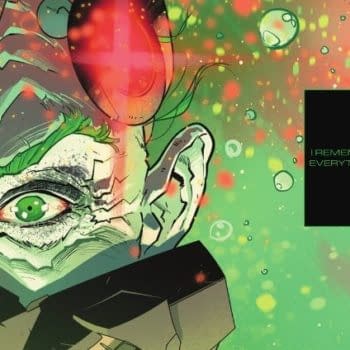Posted in: Comics | Tagged: Comics, david gabriel, entertainment, marvel, Marvel Comics
Well, At Least Everyone's Talking About Marvel Comics Today…
At the weekend, it was implied by some folk that Bleeding Cool was making a lot of fuss about nothing regarding the coverage of ICV2's retailer summit reports and interview with Marvel SVP David Gabriel.
Now, in the light of everyone else, it seems positively restrained. Here are just a few. Will the late night talks shows jump on?
Oh look, it just hit BBC's Newsnight with J. A. Micheline…
"Marvel vice president of sales David Gabriel recently claimed that he had heard from retailers that they 'didn't want female characters out there'. The comments sparked a huge backlash, with critics claiming that many other things could be to blame, including monotonous storytelling or sketchy origins. Gabriel later clarified his comments saying that the newer, diverse heros were here to stay and that other retailers claimed them as sales-boosting" – Daily Mail
"Part of the problem is the industry's legacy. Both Marvel and D.C. Comics date back more than 50 years and many of their most recognizable characters were first created in the 1930s. Superman, for instance, was the brainchild of two Jewish men whose parents immigrated to North America at the turn of the century. That character debuted in 1938 as an escape to the pending doom of war. With this kind of history, any deviation from the original character is seen as heresy." – NBC
"It's important that women and people of color remain represented throughout the comics publishing world, especially in influential positions like writer and editor. But perhaps it's more important to allow the intellectual property-farm model for the superhero industry, which marginalized those people in the first place, to pass into memory. Then a different model, which considers the rights of real people before the dollar values on fictional ones, can ascend." – The Guardian
"While Gabriel was quick to backtrack on his comments, they remain a troubling example of the struggles facing storytelling that places non-white faces at their centre — one even more embarrassing for an audience seemingly willing to blindly accept superhuman powers and inter-dimensional portals, but not so much a diverse assembly of characters." – The Telegraph
"The problem occurs when there is a disconnect between "diversity" on the page and diversity among that page's creators, which gives rise to comics that fail to realise the potential of their own characters and stories and thus get a chilly reception from readers. Then when these comics sell poorly, their deviation from the straight white male norm – not their quality – is blamed. What readers are rejecting is not diversity, but rather a failure of creativity and comprehension. If Gabriel and Marvel want to increase their comic sales, that's where they should start" – The Independent
"Whether Marvel brass wants to admit it or not, making diversity a priority over the last several years has made much of what it does political. This is the same company that made an entire event about profiling, literally called Civil War II. If sales are suffering, there are so many other things about Marvel's approach that could use re-evaluation. Focus more on better stories and less on the next big crossover. Give writers more freedom to experiment. Stop killing beloved characters only to bring them back as zombies. (Sorry, Hulk.) But inclusion and politics are a big part of what Marvel is. We've come too far to even entertain the idea of turning back." – The Verge
"Gabriel's explanation has since caused a backlash, with many fans and critics suggesting that Marvel is shifting blame onto readers for the poor sales, rather than addresing other legitimate problems like the company's reliance on confusing crossover "event" comics, rising prices and a "brain drain" of artists and writers to other more creator-friendly companies." – The Radio Times
"G Willow Wilson, author of the Kamala Khan Ms Marvel series, also disagreed with Mr Gabriel's theory, saying: "Diversity as a form of performative guilt doesn't work." Instead, he criticised Marvel's tendency to introduce the latest iteration of fan favourites by "killing off or humiliating the original character"." – The Times – though something seems to have gone wrong there.
"He's now arguing that, whereas he approves of that lesbian superhero who works on a council anti-bullying programme, he feels that Marvel should focus its energy on endangered classics such as Spider-Man, Iron Man and Thor. Yes, Captain America: Civil War, with $1.2 billion in receipts, was the most successful cinema release of 2016. But there are corners of the Crab Nebula where it barely sold a ticket." – Irish Times
"In any case, let us all prepare for another cycle of kneejerk responses to smaller sales numbers, even as the evidence all around us continues to indicate that inclusion is more of a scapegoat than the real culprit." – Slate
"He argues that retailers want more of the old characters back because they sell more, and it's a fair point – but one that shouldn't stop a push for diversity. The truth is, when film, music, the remaining elements of pop culture and culture in general, were only representing white men, comic books were already one step ahead. In 1941, when women in the US were still struggling to get a job as a receptionist, Marvel released the eighth issue of its All Star Comic, where a warrior Amazon Princess is tasked with saving the Americans from the Nazis." – Heart
"While intermittent splashy write-ups of the creative teams behind Marvel's more inclusive series are an all right start to introducing the public to its fresh heroes, it's going to take a lot more than that to court new readers (who aren't middle-aged white guys) to buy their books."– Fusion
And Bleeding Cool's Joe Glass was even called upon to talk about it on BBC Radio Wales.
And a decent stab by CBR to illustrate that, actually, diversity is not a sales problem for Marvel after all!
"Having dug into the data, it's become clear that diversity is not hurting Marvel. The truth is, Marvel's "diverse" titles actually sell decently. The problem, instead, appears to be a hollowing-out of Marvel's traditional A-List, titles whose sales have dropped by tens of thousands of copies in the past few years. Especially painful has been the collapse of X-Men sales, which once made up Marvel's bread and butter, though the Avengers and Guardians of the Galaxy lines have also seen a major declines since "Secret Wars." Blaming "diversity" only goes so far when it is series about white men and teams of white men that have been dropping the furthest."
Well, you can prove anything with facts…












